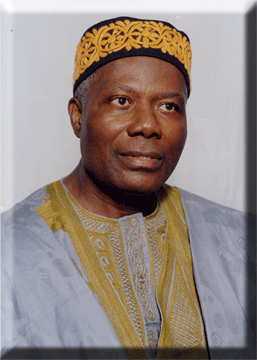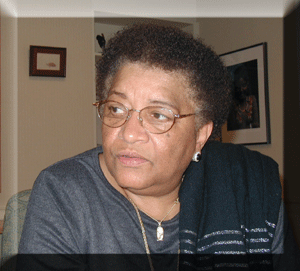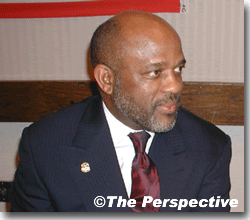
No elections in the absence of stabilization force, say opposition leaders
By Abdoulaye W. Dukulé
The Perspective
Atlanta, Georgia
 |
 |
 |
|
Togba-Nah Tipoteh
|
Ellen Johnson-Sirleaf
|
Charles W. Brumskine |
However, from the perspective of the opposition, nothing points to the possibility of elections in a six-month period. According to Dr. Tipoteh of the Liberian People’s Party (LPP), it would take no less than a miracle to have free and fair elections in Liberia within six months. Speaking to us from Monrovia, Dr. Tipoteh said that security conditions are such that it would be unimaginable to envision the possibility of people going out to campaign or to vote in six months without some drastic changes in the current situations.
Former Senator Charles Brumskine of the Liberian Unification Party (LUP), who returned to Monrovia a few months ago, echoed Dr. Tipoteh words. Mr. Brumskine said that in the current climate of fear and intimidation by the government, nobody could talk about elections. He drew attention to his own situation. Mr. Brumskine went home in January and joined LUP with a view of participating in the electoral process. He said the basic rights of Liberians are being denied everyday by the government in total disregard of the laws. Since he returned to Liberia in early 2003, Mr. Brumskine has been a virtual prisoner, confined to Monrovia. The government confiscated his passport and kept him from traveling in the West Africa. He was finally given a travel document but the government is now asking him to surrender his American Green Card before giving an exit visa, a measure that was reinstated a few days before Brumskine was scheduled to travel to Abuja to meet with President Obasanjo of Nigeria.
The situation of Brumskine epitomized the level of intimidation and also carefree attitude of the government when it comes to the rights of Liberians. If there was any doubt about the attitude of the Taylor regime towards dissent, the Brumskine case clarified things. If Mr. Brumskine, who intends to run for president, and therefore to campaign throughout the country has not been allowed by government to visit his own hometown just two hours away, one can just imagine political candidates campaigning in Cape Palmas or Nimba.
Many opposition leaders and civil rights activists, including former President Amos Sawyer, human right lawyer Tiawon Gongloe, journalist Hassan Billity, human right Aloysius Toe, Commany B. Wesseh were arrested, tortured and or beaten by security forces and forced to leave the country. In an unprecedented move, the government of Liberia "deported" one of its own citizens, in the case of Hassan Billity. Aloysius Toe was arrested and tortured for many months and was recently brought to trial. Many more are still languishing in dehumanizing conditions in jail.
Mrs. Ellen Johnson-Sirleaf of the Unity Party (UP) supported the views expressed by Dr. Tipoteh and Mr. Brumskine and said that Liberia is in such a deplorable condition and that the situation is so critical that one should not even be talking about elections. She said that it is inconceivable to have elections when people cannot go from one place to another in the country and added that a great number of Liberians live in appalling conditions in refugee and displaced camps.
According to the opposition leaders, the presence of an international force after a verifiable cease-fire between government and LURD is indispensable for the holding of free and fair elections. Dr. Tipoteh said that a peace conference was being convened by ECOWAS in Accra, Ghana around mid-May and hoped that this conference would allow all parties to put their grievances on the table. According to him, President Taylor has promised to lead the government delegation and be flexible.
It is however not certain if LURD would be present or which "LURD" would attend the talks in Accra. A few weeks ago, a similar conference was to be organized in Mali but President Amadou Toumani Toure withdrew his invitation after President Conteh of Guinea said he would not be party directly or indirectly to any kind of peace talks involving Taylor. The Malian government said that it would not talk to LURD without the involvement of President Conteh. In March 1992, in Dakar, President Conteh made his famous remarks when he said that NPFL leader Taylor was a cancer and would some day destroy the sub region if he were not dealt with.
Among the many tenuous issues impeding the holding of free and faire elections, Dr. Tipoteh insisted on the issue of the elections commission, saying that the fact that Taylor added two new members does in no way alleviate the fears of the opposition, because the five previous members who would make the majority and most likely vote the same way. Ambassador Gordon Streeb, of the Carter Center also told us in a previous conversation that he raised the issue of the commission with President Taylor. However, Dr. Tipoteh said that all of these matters could be dealt with once there is a cease-fire and conditions are created for the holding of free and fair elections.
When asked what would happen if elections were not held on time, Mr. Brumskine said that "the date were not cast in stone", adding that if there were a prospect of an international force being put together on time to meet the deadline for the constitutional date for the transfer of power in mid-January, elections could be postponed by a month or so to allow for the deployment of the security forces.
Regarding the issue of the timeline for elections, Dr, Tipoteh said that if elections were not held on time, the country would be faced with a constitutional crisis because the government would become unconstitutional. When asked if he would therefore push for transitional governance, he said that the issue is now being discussed among political parties and civil society groups although no concrete format has yet been adopted.
Mrs. Johnson-Sirleaf said that she has serious doubts about the possibility of free and fair elections as long as Mr. Taylor is party to the process. She said that given his tract record, it is hard to conceive that Mr. Taylor would allow an absolute free and fair process where he has any chance of losing the elections.
Some political parties are however involved in matchmaking, "just in case of a miracle and elections are held," as one political leader put it. LUP, LAP UP and the Free Democratic Party have decided to collaborate and put forward a single slate of candidates for elections. This means that, at least in theory, Brumskine and Johnson-Sirleaf would not be contesting for the same position. Although the mechanism of such collaboration has yet to be defined in details, there is seems to be a great deal of commitment for the reduction of number of candidates. When asked why his party, LPP was not among the four parties, Dr. Tipoteh said that they did not see wisdom in signing to such a major political action without a mandate from the political base. He said that at the convention, the party would decide how to collaborate with other political organizations.
In 1997, the parties tried to put together such a scheme but mistrust disrupted the process and led to the victory of the National Patriotic Party (NPP) of Charles Taylor. The other two major parties on the ground, the True Whig party (the oldest of the country) and the United People’s Party (UPP) have yet to indicate how they intend to participate in the up-coming electoral process. Some observers believe that the TWP under its Secretary General Sherman would most likely collaborate with the NPP. In the UPP, with Mr. Baccus Matthews closely linked to the government through his Public Relations work with OTC, the logging company that is, according to the UN and Global Witness, providing both cash and arms to the Taylor government, there seems to be a big divide. A group led by Mr. Matthews is said to be pushing for a collaboration with the NPP and have a UPP member as a possible vice-presidential candidate to Taylor in the next elections while another branch, mostly based in the US, is resisting any attempt to "sell UPP to NPP." The new leadership at the All Liberian Coalition Party (ALCOP) is also steering the party towards the NPP. They have "fired" their former standard-bearer and there are indications that the party is moving closer to the NPP.
How would all this play out depends pretty much on the outcome of the Accra proposed meeting and how things unfold at the Special War Crime Tribunal in Freetown, Sierra Leone. If Liberians obtain the rapid deployment of a stabilization force on the ground, a verifiable cease-fire, some parties may decide to take chances at running alone. This could lead to a repeat of 1997, because the NPP still controls the power structure, has more money and controls the media. Mr. Taylor would not allow a defeat at the polls, even if it would cost him the last bag of rice he can provide. The other unknown factor that could influence the electoral process is the outcome of the War Crime Tribunal of Sierra Leone. As things develop, it becomes more and more certain that the Liberian president could be indicted. This would change every issue in the country.
Expectations are high for the upcoming peace talks in Accra. Every one hopes the government of Liberia would unconditionally accept a cease-fire, the deployment of a stabilization force and creating a level playing field for the holding of free and fair elections. As usual, with his back to the wall (or to the sea), with UN sanctions, the Special War Crime Tribunal and his isolation in international political circles, Mr. Taylor may give in and sign a piece of paper. In 1990, in Lome, Togo, in 1992, in Yamoussoukro Cote d’Ivoire and Geneva, Switzerland, in 1993 in Cotonou, Benin, in 1996 Abuja, Taylor signed many accords, on the same issues: cease-fire; disarmament; and the holding of free - fair elections. Why would he abide by his signature now? Is he more honorable now than he was when 10 years ago? Is he more committed to democratic principles and good governance now than he was then?
In the past two years ECOWAS has not always been very helpful in approaching Liberian issues. This is even truer today with Dr. Mohamed Chambas as Executive Secretary at the helms of the regional organization. During the rule of Jerry Rawlings, the mentor of Dr. Chambas, Ghana was the second strongest element of ECOMOG and always played a "balancing" act that favored Mr. Taylor. Dr. Chambas was among those who crafted the Ghanaian Liberian policy, along with Captain Tsikata, Rawlings national security advisor. The heavy presence of Libya in Ghana was an influential factor. With this background, those going to negotiate under the auspices of ECOWAS should be aware that they might be walking into a political minefield. Dr. Chambas has never missed a chance to rescue his friend Taylor. And now faced with a last chance to salvage him, the ECOWAS Secretary would certainly spare no efforts.
Liberia does not attract much sympathy from outside these days. It would be highly unlikely that ECOWAS could manage to put together a stabilization force together in less than two months. It took ECOWAS 3 months to mobilize less than 2000 soldiers for peacekeeping in Cote d’Ivoire, a situation that was considered a regional emergency and claimed the attention of every one on the continent.
Maybe the formation of an interim government would be the best of solutions. Because ECOWAS may just find Taylor a way-out of his difficult position and grant him another six years to "clean his act."
A few months ago, Dr. Jendayi Frazer, Special Assistant to President Bush and Senior Director for African Affairs at the White House said that they have no doubt that Taylor would rig the elections and added that their policy towards the government of Liberia is to try to contain the predatory nature of Taylor. Containment has not worked and is becoming costly, not only for Liberia and the sub-region but donor countries like the US who are spending millions to feed refugees. It would cost much less to oust Taylor than to keep paying for failed peace processes and feeding millions of refugees, while an entire region is plunging into chaos. This is what Liberians need to discuss, not another peace settlement that would pave the way to another six-year term for Taylor.
